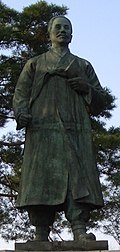
Back شين تشيهو Arabic شين تشيهو ARZ Shin Chae-ho German Shin Chae-ho French Sin Chae-ho ID 申采浩 Japanese 신채호 Korean Shin Chaeho LFN Син Чхэхо Russian 申采浩 Chinese
Shin Chae-ho | |
|---|---|
| 신채호 | |
 | |
| Born | December 8, 1880 Chungcheong, Sannaeri, Joseon |
| Died | February 21, 1936 (aged 55) |
Philosophy career | |
| Alma mater |
|
| Awards | Presidential Order of Merit for National Foundation (1962) (PH)[1] |
| Era | 19th- / 20th-century philosophy |
| Region | Eastern philosophy |
| School | |
Main interests | |
Notable ideas | |
|
Preview warning: Page using Template:Infobox philosopher with unknown parameter "influences" Preview warning: Page using Template:Infobox philosopher with unknown parameter "influenced" | |
| Korean name | |
| Hangul | 신채호 |
| Hanja | |
| Revised Romanization | Sin Chae-ho |
| McCune–Reischauer | Sin Ch'aeho |
| Art name | |
| Hangul | 단재 |
| Hanja | |
| Revised Romanization | Danjae |
| McCune–Reischauer | Tanjae |
Shin Chae-ho, or Sin Chaeho (Korean: 신채호; December 8, 1880 – February 21, 1936), was a Korean independence activist, historian, anarchist, nationalist, and a founder of Korean nationalist historiography (민족 사학, minjok sahak; sometimes shortened to minjok).[2]: 7 [3]: 27 [4]: 52 He is held in high esteem in both North[5]: 112–3 and South Korea.[6]: 26–7
Two of his works, A New Reading of History (Doksa Sillon), written in 1908, and The Early History of Joseon (Joseon Sanggosa), published in 1931, are considered key works of nationalist historiography in modern Korea.[7]: 445 He argued that modern Koreans and the people of Manchuria were of a single race which has an ancestral claim to both Korea and Manchuria,[6]: 26 [8]: 3 Shin also studied Korean mythology.[4]: 53 During his exile in China, Shin joined the Eastern Anarchist Association and wrote anti-imperialist and pro-independence articles in various outlets; his anarchist activities lead to his arrest and subsequent death in prison, February 21, 1936.[7]: 447 [9]: 128

- ^ Bae, Ji-sook (March 2009). "Independence Fighter to Get Family Register". The Korea Times. Archived from the original on 25 June 2014. Retrieved 25 June 2014.
- ^ Ch'oe, Yŏng-ho (1980). "An outline history of Korean historiography". Korean Studies. 4: 1–27. doi:10.1353/ks.1980.0003. S2CID 162859304.
- ^ Park, So-yang (Jan 2012). "Speaking with the Colonial Ghosts and Pungsu Rumour in Contemporary South Korea (1990-2006): The Pungsu (Feng Shui) Invasion Story Surrounding the Demolition of the Former Japanese Colonial-General Building and Iron Spikes". Journal for Cultural Research. 16 (1): 21–42. doi:10.1080/14797585.2011.633834. S2CID 143580293.
- ^ a b Robinson, Michael (1986). "Nationalism and the Korean Tradition, 1896-1920: Iconoclasm, Reform, and National Identity". Korean Studies. 10: 35–53. doi:10.1353/ks.1986.0001. S2CID 153349101.
- ^ David-West, Alzo (2011). "Between Confucianism and Marxism-Leninism: Juche and the Case of Chǒng Tasan". Korean Studies. 35: 93–121. doi:10.1353/ks.2011.0007. S2CID 144136781.
- ^ a b Schmid, Andre (Feb 1997). "Rediscovering Manchuria: Sin Ch'aeho and the Politics of Territorial History in Korea". The Journal of Asian Studies. 56 (1): 26–46. doi:10.2307/2646342. JSTOR 2646342.
- ^ a b Shin, Yong-ha (2004). "The philosophical world of Sin Chae-ho". In Lee, Seung-Hwan; Korean National Commission for UNESCO (eds.). Korean Philosophy: Its Tradition and Modern Transformation. Seoul, South Korea: Elizabeth, NJ – Hollym. pp. 441–461. ISBN 1565911784.
- ^ Armstrong, Charles (1995). "Centering the Periphery: Manchurian Exile(s) and the North Korean State" (PDF). Korean Studies. 19: 1–16. doi:10.1353/ks.1995.0017. S2CID 154659765.
- ^ Robinson, Michael (1984). "National Identity and the Thought of Sin Ch'aeho: Sadaejuǔi and Chuch'e in History and Politics". Journal of Korean Studies. 5: 121–142. doi:10.1353/jks.1984.0003. S2CID 144453287.
© MMXXIII Rich X Search. We shall prevail. All rights reserved. Rich X Search